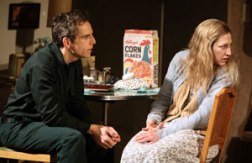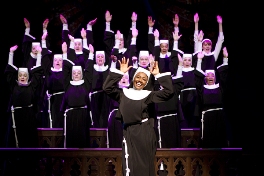Review: Baby It's You!
Apr 28th

You can’t say that the new musical Baby It’s You! is shy about its intentions. In the opening moments of this show about the mega-selling ‘60s girl group The Shirelles, an image of a jukebox is projected. Clearly this new effort conceived by Floyd Mutrux (Million Dollar Quartet) is aiming to be a jukebox musical competitor to Jersey Boys. Except in this case a more accurate title would be “Jersey Girls.”
Written by Mutrux and Collin Escott, the show is actually less concerned with The Shirelles, who barely emerge as characters here, than in telling the story of Florence Greenberg, the Passaic, New Jersey housewife who became a record mogul and shepherded the group to stardom.
Beth Leavel (The Drowsy Chaperone) stars as the driven Greenberg, a pre-feminist era music industry pioneer who discovered the singing group at her daughter’s high school. Much to the consternation of her husband Bernie (Barry Pearl), she embarked on a career that eventually led to her own independent record label, Scepter Records, and a string of hits by the group that included “Dedicated to the One I Love,” “Soldier Boy,” “Mama Said” and “Baby It’s You.”
Those songs are dutifully recreated here (with “Will You Love Me Tomorrow” a surprising omission). But since the group didn’t have all that many chart-topping singles, the show’s score is augmented by other classics from the era like “Sixteen Candles,” “Shout,” “Louie Louie,” “It’s My Party,” “Duke of Earl” and “You Really Got a Hold on Me,” among many others.
Awkwardly intermingling songs done performance style and in the context of the book—at one point Bernie chides his wife by singing “Yakety Yak”—the show lacks the narrative drive and theatrical pizzazz that has made Jersey Boys such a smash. Most of the drama stems from Greenberg’s interracial affair with Luther Dixon (Allan Louis), the record producer/composer who became her partner in the company.
But it’s still pretty entertaining, thanks to the non-stop assemblage of memorable pop hits that are well performed by the ensemble, which includes Erica Ash, Kyra Da Costa, Christina Sajous and Crystal Starr Knighton as the Shirelles and Geno Henderson impersonating such stars as Chuck Jackson, Ron Isley and Gene Chandler as well as performing narration duties.
Leavel anchors the proceedings with her dynamic performance in the central role, as well as lending her impressive pipes to such numbers as “Don’t Make Me Over” and “Tonight’s the Night.” She also looks terrific in an array of eye-popping outfits courtesy of costume designer Lizz Wolf.
The other performers do mainly well by their sketchily written roles, although some of them come dangerously close to caricature.
Relying heavily on projections of vintage photos evoking the era, the production is little more than serviceable, although it moves briskly along under the direction of Mutrux and Sheldon Epps. The music is really the star here, with Don Sebesky’s arrangements well played by the eight-piece band whose members are located on multiple platforms above the stage.
Broadhurst Theatre, 235 W. 44th St. 212-239-6200. www.Telecharge.com.
Review: The House of Blue Leaves
Apr 26th

In his revelatory production of Thornton Wilder’s Our Town, director David Cromer unearthed the darkness underlying a play that is usually presented as a paean to a more innocent America. He applies the same approach to the new Broadway revival of John Guare’s 1966 absurdist comedy The House of Blue Leaves, but with vastly diminished results. The production captures the desperation and pathos of the play’s troubled characters, but at the cost of the play’s humor.
This is yet another star-driven revival, albeit one with some pedigree. Ben Stiller plays the lead role of Artie Shaughnessy, the Queens zookeeper who dreams of making it big as a songwriter, and it’s something of a homecoming--he played the AWOL son Ronnie in the landmark 1986 Lincoln Center production, and his mother, Anne Meara, appeared in the play’s 1971 Off-Broadway premiere. He’s joined here by Edie Falco as Artie’s schizophrenic wife Bananas, and Jennifer Jason Leigh as Bunny, the downstairs neighbor with whom Artie plans to flee to California in pursuit of stardom.
As the play begins, we see Artie singing his terrible songs in a seedy bar while being pointedly ignored by the loud patrons. As he keeps desperately pleading for their attention, the scene seems to go on forever, and his pain becomes palpable. Unfortunately, it soon comes to be shared by the audience.
Guare’s play requires a delicate balance of tone to be successful, which director Jerry Zaks provided in the Lincoln Center revival. He was aided by a pitch-perfect cast: John Mahoney, who brought charm as well as pathos to Artie; Swoosie Kurtz, heartbreakingly moving as Bananas; and Stockard Channing, wonderfully funny as Bunny.
Here, the major cast members don’t seem to jell. Falco emphasizes Bananas’ emotional catatonia to such a degree that it simply becomes tedious. Leigh’s Bunny is all surface mannerisms with little of the charm that would entice anyone to run away with her. And Stiller, normally so adept at conveying passive-aggressive obnoxiousness, barely registers in the lead role.
Some compensation is provided by the supporting players, especially Alison Pill, who lives up to her last name with her endearingly daffy portrayal of the deaf Hollywood starlet who shows up at the apartment, and Halley Feiffer, as one of the trio of nuns who burst onto the premises hoping for a good vantage point to witness the impending arrival of the Pope. And Christopher Abbott, as the son who dreams of becoming famous by an act of terrorism, beautifully nails his hilarious monologue about auditioning for the role of Huckleberry Finn for his father’s childhood friend (Thomas Sadoski), now a big shot Hollywood director.
The evening walks a very fine line between wild comedy and tragedy, but director Cromer seems intent only on delivering the latter. On that level he succeeds, with the shocking climactic act of violence rendered with a visceral intensity. House of Blue Leaves has lost none of its relevance in its exploration of both ordinary souls living lives of not so quiet desperation and the irresistible allure of fame. But this overly muted rendition, while occasionally displaying moments of stunning theatricality, provides little of the sugar that would help its medicine go down.
Walter Kerr Theatre, 219 W. 48th St. 212-239-6200. www.Telecharge.com.
Review: Born Yesterday
Apr 25th

The title of Garson Kanin’s play proves all too accurate with the new Broadway revival of Born Yesterday. This comedy about a crooked businessman in cahoots with corrupt politicians may have been written in 1946, but it seems timelier than ever in this era of tawdry Washington backroom dealings. The same can’t quite be said of its romance plotline, which has become familiar via the endless imitators that have followed it.
The main specter hanging over the production, of course, is Judy Holliday, whose indelible performance as the not-so-dumb showgirl Billie Dawn was immortalized in George Cukor’s hit 1950 screen adaptation. It’s a daunting challenge for any young actress, but Nina Arianda, a newcomer who made a big splash last year in Off-Broadway’s Venus in Furs, acquits herself nicely.
As does Jim Belushi in the central role of Harry Brock, the scrap-metal tycoon from New Jersey who muscles anyone who tries to get in his way. It’s no surprise that the actor would effectively convey the character’s bluster and vulgarity. But in this rather dark-tinged production directed by Doug Hughes, he also conveys a genuine menace that ups the reality quotient even if it occasionally detracts from the play’s humor. When his Brock slaps Billie around, it’s a genuinely shocking moment that produces gasps from the audience.
Arianda, whose sexy gams are well showcased in a variety of slinky outfits courtesy of costume designer Catherine Zuber, is delicious as Billie, infusing her line readings with an amusing Betty Boop vocal style. She’s far more sexed-up than was Holliday, who more effectively conveyed the character’s sweetness and underlying intelligence. When her Billie comes on to Paul (Robert Sean Leonard), the journalist hired by Brock to tutor her in the ways of Washington, there’s little doubt about her carnal intentions.
Unfortunately, Sean Leonard is so stiff and humorless in the role—unlike William Holden, who brought a genuine twinkle to his performance in the film—that the blossoming love affair between Paul and Billie never feels convincing.
The other main problem with the revival is its sluggish pacing, which makes the two-and-a-half hour running time seem even longer. The production never quite crackles, with the actors delivering their comic banter in far too ponderous fashion. This is particularly true of such normally reliable supporting players as Frank Wood as Brock’s scheming lawyer and Terry Beaver as a corrupt senator, although Michael McGrath gets it right as a dim-witted henchman.
It sure looks swell, however, with John Lee Beatty’s lavish set design of a garish hotel suite garnering its own well-deserved applause.
Cort Theatre, 138 W. 48th St. 212-239-6200. www.Telecharge.com.
Review: Jerusalem
Apr 22nd

Considering his brilliant comic turn earlier this season in the revival of La Bete and now his titanic performance in Jez Butterworth’s new play Jerusalem at the same theater, we might as well engrave actor Mark Rylance’s Tony Award right now. We also might as well hand over the Music Box Theatre to this dazzling thespian so he can pretty much do whatever he wants with it.
Imported to Broadway after successful runs at London’s Royal Court and on the West End, Jerusalem is a rambling, phantasmagorical play in which everything and nothing happens. Simultaneously a portrait of its hypnotic lead character, the drunken wastrel Johnny “Rooster” Bryon, and a depiction of an England torn between its mystical past and repressive modern society, it is a work that is endlessly intriguing even if it occasionally tries one’s patience.
Living in a dilapidated trailer home in a remote wooded area, Rooster is a former daredevil stunt rider who has retreated to a life of drink, drugs and hosting wild bacchanalias for friends and strangers, ranging from his best friend Ginger (Mackenzie Crook) to a pair of thrill-seeking teenage girls (Molly Ranson, Charlotte Mills) to an elderly philosopher dubbed “The Professor” (Alan David).
After a typical night of debauchery depicted in a frenzied opening scene set to ear-splitting techno music, Rooster wakes up and performs his morning ablutions, which include dousing his head in a bucket of water before indulging in vodka and speed. Along comes Ginger, mightily pissed off after having missed the previous night’s festivities.
Over the course of three acts lasting more than three hours, several plot elements emerge, including the impending departure to Australia of local boy Lee (John Gallagher, Jr.); Rooster’s tense reunion with his estranged wife (Geraldine Hughes) and six-year-old son; the disappearance of a teenage girl (Aimee-Ffion Edwards) with whom Rooster has a mysterious relationship; and the efforts of the local authorities to banish Rooster and his cronies from their bucolic surroundings.
But the vague, sprawling narrative is far less important than the depiction of the almost literal force of nature that is Rooster, who regales his followers with such tall tales as an encounter with a giant who claims to have built Stonehenge and who seems to have a mystical ability to control people with his eyes.
The densely flowing dialogue, alternately lyrical and rudely profane, can prove wearisome at times. But director Ian Rickson has provided such an endlessly rich, fully-lived in production that one can overlook the play’s longueurs. The wonderfully detailed set, featuring towering trees and an assortment of live animals including roosters, a turtle and a golfish, provides the sort of surreal atmosphere in which seemingly anything can happen.
The large supporting cast is perfection, although special praise must be accorded Crook, hilarious as the hapless Ginger; Gallagher, Jr., appealing as the personable Lee; and Hughes, deeply sympathetic as the beleaguered wife.
But it is Rylance’s titanic presence that galvanizes the evening. The actor, virtually unrecognizable from his previous Broadway stints in Boeing-Boeing (for which he won a Tony) and La Bete (for which he will surely be nominated), is endlessly compelling, even when his character is simply quietly taking in the madness surrounding him. Using a deeper voice and seemingly thickened body to create a physically arresting figure, he delivers the sort of landmark performance that will inevitably be compared to such similar acting chameleons as Laurence Olivier and Daniel-Day Lewis.
Music Box Theatre, 239 W. 45thSt. 212-239-6200. www.Telecharge.com.
Review: Sister Act
Apr 21st

There’s fun, if not musical comedy heaven, to be found in Sister Act, the new Broadway musical adaptation of the hit 1992 movie starring Whoopi Goldberg. Featuring plenty of talent both on and off stage, the show boasts some terrific performances, an engaging ‘70s era-style soul-flavored score, and a few raucous laughs. But its relentlessly juvenile humor eventually proves more wearisome than soul lifting.
The book by veteran TV comedy writer Cheri and Bill Steinkellner (Cheers, The Jeffersons, Who’s the Boss?) and featuring “additional material” (read, more jokes) by Douglas Carter Beane hews closely to the film’s plotline about an African-American nightclub singer, Deloris Van Cartier (Patina Miller), who witnesses a murder by her gangster boyfriend Curtis (Kingsley Leggs). To avoid their star witness being similarly dispatched before she can testify in court, the police sequester her in a convent populated by a gaggle of nuns led by a prim and proper Mother Superior (Victoria Clark).
Much of the show’s all too predictable humor derives from the earthy Deloris’ shaking up the stodgy convent, in particular her transformation of its ramshackle choir into a roof-raising R&B singing group that electrifies the services and promises to restore the institution’s depleted finances.
For this musical version produced by Goldberg, a subplot has been added involving a burgeoning romance between Deloris and Eddie (Chester Gregory), the cop assigned to her case who turns out to have had a crush on her since high school.
Director Jerry Zaks has apparently punched up the show considerably since its London incarnation, and it certainly moves along at a zesty pace. And some of the musical numbers written by composer Alan Menken and lyricist Glenn Slater are indeed terrific. “Take Me to Heaven” is a rousing opener; “When I Find My Baby,” a love song that takes on sinister implications, is an amusing imitation of the Philly soul style; “I Could Be That Guy,” in which the nerdy Eddie discovers his inner lothario, benefits from Gregory’s charismatic singing and dancing and some dazzling quick costume changes; and the ballad “Haven’t Got a Prayer” is a fine showcase for Clark’s vocal talents.
Miller, a relative newcomer who received an Olivier nomination for her performance, is a real find, displaying estimable comic chops and a powerhouse singing voice as the sassy Deloris. Gregory, so wonderful as Jimmy Early in the recent revival of Dreamgirls, is winning as the lovestruck cop; Clark makes the most of her stock role as the conservative Mother Superior; and Leggs is both fearsome and funny as the revengeful hood.
But the talent extends even to the supporting roles, with solid comic turns by Fred Applegate as a beleaguered monsignor; John Treacy Egan, Caesar Samayoa and Demond Green as Curtis’ henchmen; and Marla Mindelle, Sarah Bolt and Audrie Neenan as a trio of nuns who fall under Deloris’ spell.
While the jokes miss as often as they hit (“You mean I gotta go incognegro?” asks Deloris in an example of the former), there are enough amusing one-liners to keep the evening flowing painlessly.
Much amusement is also provided by Lez Brotherston’s costumes, including the outlandishly gaudy, sequin-covered habits that the nuns sport in the stirring closing number “Spread the Love Around.”
Broadway Theatre, 1681 Broadway. 212-239-6200. www.Telecharge.com.